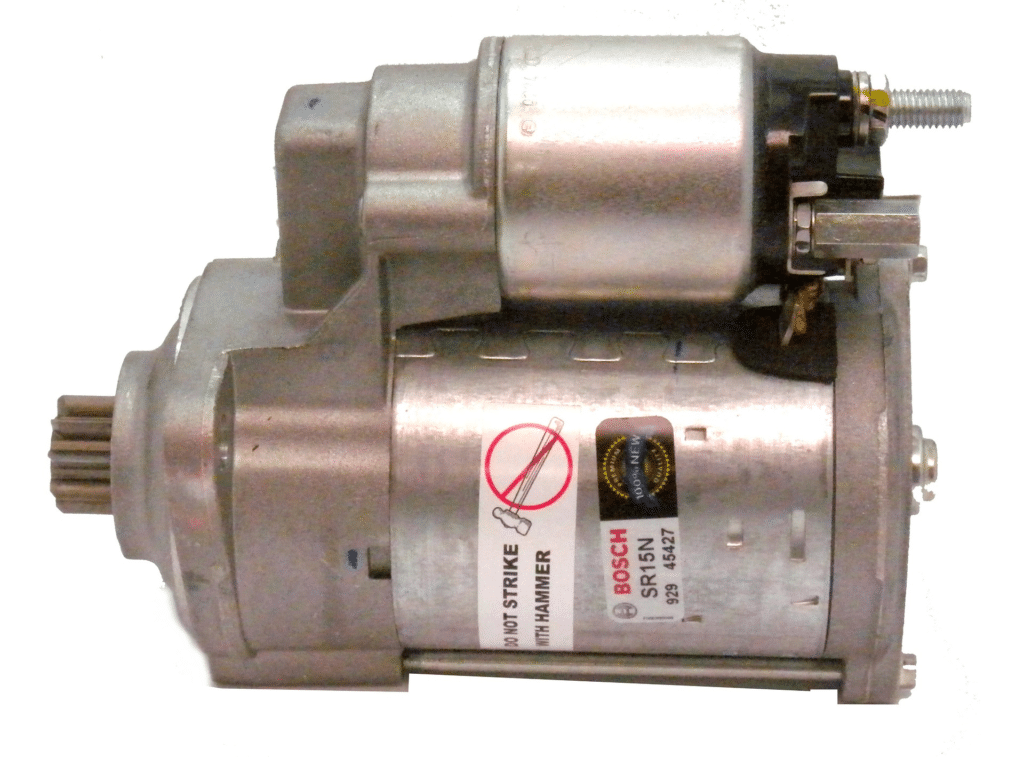
Image by Jason Priest from Pixabay
If your car or truck has difficulty starting, you may have wondered, “Do I need a new alternator or starter?” Keep reading to learn the signs of a broken car starter, which often overlap with bad alternator and battery symptoms. You want to know if your starter is faulty so you can schedule an appointment with your mechanic immediately.
How Your Battery, Starter, and Alternator Work Together
Before we launch into the symptoms of a bad starter, let’s review how your vehicle’s electrical system works when starting it up. When you turn the key in the ignition, energy stored in the battery powers the starter motor. The starter gear engages with the flywheel and turns the engine over.
An engine belt then turns the alternator’s pulley. This spins an electromagnet inside a series of copper windings (stator) and generates electrical power. That power not only continues to charge your battery as you drive, but it also provides energy for all the electrical items in the vehicle.
Signs You Need a New Car Starter
Have you experienced any of these problems recently?
- You try to start your vehicle, but the engine won’t crank and all you hear is a loud click.
- When you attempt to start the ignition, you hear grinding or clicking noises from worn starter gears, with no turnover.
- You can run your radio, headlights, dashboard, etc., just fine, but the engine will not start.
These are the primary signs of a faulty vehicle starter. You might be troubled by these signs every time you try to start your car, or they might occur intermittently. Laboured starting and an engine that eventually but reluctantly turns over is often an early sign of a starter that’s beginning to fail.
Other potential signs of a problem starter include:
- A whirring noise when you start the vehicle (aka “freewheeling”) because the starter motor isn’t connecting with the flywheel, and the flywheel keeps spinning.
- The starter keeps running, and your vehicle sounds like it’s just starting up even after the engine turns over.
- You see smoke or smell something burning, which can occur if there is a nearby leak compromising your starter’s function. (Your mechanic may find oil on the starter.)
Causes of Starter Failure
Sometimes simple wear and tear that occur with age and long-term use are responsible for a failing starter. However, there are other factors that can hasten the demise of the starter in your car, truck, or van or cause it to fail temporarily:
- Excessive water exposure that causes corrosion, electrical shorts, or loss of lubrication
- Poor starter installation (worth checking if you just got your starter replaced)
- Overheating of the vehicle’s engine and temperature extremes
- Dirty or corroded starter connections
- Oil leaks that damage the starter
- Bad starter relay (results in no crank or continuous crank)
- Loose wires running to or from the starter
Is It Your Starter, Your Battery, or Your Alternator That’s Faulty?
Because the starter, battery, and alternator all work in concert, as described above, it can be challenging to sort out whether you have a faulty starter or if it’s a problem with the other related components. While your mechanic can make the determination for you once you have an appointment, here are a few tips to clue you in:
- Rotten egg smell? Swelling from the battery case? These are signs of a bad battery, along with an illuminated low-battery light on the instrument panel and slow engine cranking.
- If you see a check engine light or excessively high or low voltage on your gauge, it’s more likely to be your alternator causing problems. Other signs of a bad alternator include inconsistent headlamp brightness, slow power window responsiveness, or grinding noises under the hood.
One way to help narrow down the culprit is to perform the jump start test. Look for these signs that point in one direction or another:
- The vehicle won’t start, even with a jump. That’s probably your starter’s fault.
- It starts with a jump, but when you unhook the cables, the engine dies. That indicates the alternator isn’t maintaining sufficient current.
- Your vehicle starts and runs once jumped but may need a jump every time you run it. This is a sign that your battery needs checking or replacement.
Sometimes tapping the starter carefully with a firm object can get the auto to start when it won’t at first. This works if there’s rust or corrosion on the starter brushes that needs to be knocked loose in order for it to run. But it’s not a long-term solution — it’s merely an emergency fix that can keep you from being stranded.
Don’t Wait to See Your Mechanic About a Bad Starter
Not being able to start your vehicle, especially if you’re in a more remote area of British Columbia in winter, is obviously something you want to avoid. Therefore, if you suspect your starter is failing, call your mechanic and get the vehicle in right away. Your mechanic can determine if it is indeed the starter and what needs to be done next. They can also check your alternator, battery, and other electrical elements, like wires that may be loose or a broken ignition switch.
Delaying your appointment can cause engine damage, undue battery wear, unsafe lighting, and other issues you want to prevent. You may not even need to replace your starter; sometimes it’s just the starter’s motor, relay, or solenoid that needs fixing. An experienced mechanic can usually repair those parts for you and get you back on the road quickly.
